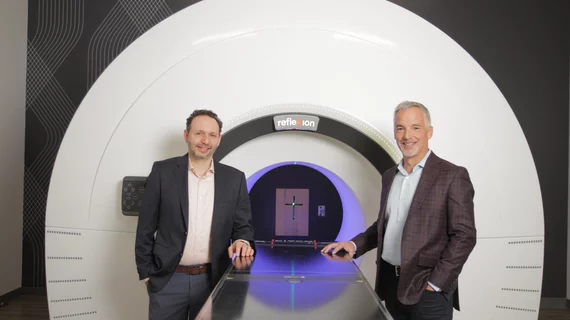FDA grants passage to autonomous, biology-guided radiotherapy
A therapeutic oncology company has been cleared to market a cancer treatment that that turns a tumor’s own biology into a self-signaling target for radiation therapy.
RefleXion Medical of Hayward, Calif., announced the FDA approval Feb. 2.
The company says the system, called Scintix, works autonomously with RefleXion’s X1 radiotherapy equipment to beat back solid tumors of any stage.
The X1 is a combination PET machine and linear accelerator designed to precisely irradiate tumors regardless of their movements while sparing healthy adjacent tissues.
Patients receive a radiotracer injection before the treatment, and the X1 use the emittance data to aim the radiation beams, the company explains.
“This crosstalk between the tumor and the X1 requires the system to rotate at 60 rpm—making it the first and only radiotherapy machine to spin at this speed,” RefleXion says.
The Scintix biologic modality keeps up with tumor movements whether they’re caused by predictable internal processes or by unintended patient motion.
The Feb. 2 announcement quotes Terence Williams, MD, PhD, chair of radiation oncology at City of Hope (formerly Cancer Treatment Centers of America).
Williams says the Scintix technology “ushers in a new era of external-beam radiotherapy by harnessing data produced from the biologic process of cancer cells, which until now has been untapped.”
RefleXion says FDA initially cleared the technology for use with the radiotracer fludeoxyglucose F18, aka FDG. With the latest regulatory hurdle cleared, the company says it will adapt its Scintix methodology to work with any number of novel radiopharmaceuticals currently under development for different cancer types.
The company’s president and CEO, Todd Powell, says RefleXion had to clear “unprecedented hurdles as medical device and pharmaceutical teams within the FDA worked together to create a new classification regulation for this breakthrough device and therapy.”
RefleXion founder and CTO Sam Mazin, PhD, says autonomous radiotherapy “was just a concept over a decade ago, but now for the first time in the history of cancer treatment, the individual biology of the cancer itself guides its own destruction.”
Full announcement here.

